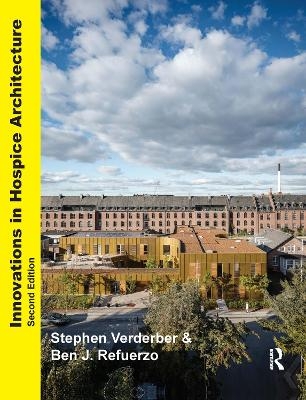
Innovations in Hospice Architecture
Routledge (Verlag)
978-0-367-31292-3 (ISBN)
an overview of the historical origins of the contemporary hospice
the diverse variations on the basic premise of hospice care
a review of the scant architectural literature published on this subject to date
a broad series of case studies of exemplary hospices around the world
planning and design concepts for palliative care environments.
Case study projects are from Japan, Canada, Europe, Africa, Australia, Indonesia, China, the United States and South America. Thirty-six case studies are individually presented and comparatively analysed, and prognostications for the future of hospice architecture are examined. Each case includes floor plans, technical drawings and beautiful, full colour illustrations. Through an in-depth discussion of the inner profundities of hospice architecture, the book presents this type as a humane, genuine expression of the spiritual, physical and psychosocial dimensions of the contemporary death and dying movement. Written with a broad audience in mind, the book provides both technical and conceptual information, blending narrative, images and diagrammation so that the audience may understand and articulate the complexities of this specialized building type in professional practice contexts.
Stephen Verderber is an award-winning scholar/researcher, and Registered Architect (US) whose core focus is architecture, design therapeutics and health. He is Professor at the John H. Daniels Faculty of Architecture, Landscape and Design, and in the Dalla Lana School of Public Health at the University of Toronto, in Canada. He is Director of the Centre for Architecture, Design + Health Innovation at the U. of Toronto, and is a principal of R-2ARCH. He is widely published and his books include Healthcare Architecture in an Era of Radical Transformation (2000), Compassion in Architecture: Evidence-Based Design for Health (2005), Innovations in Hospital Architecture (2010), Innovations in Transportable Healthcare Architecture (2016), Innovations in Behavioral Health Architecture (2018) and Thinking While Doing: Explorations in Educational Design-Build (2019). Ben J. Refuerzo is an award-winning principal in the firm R-2ARCH and Professor at the University of California Los Angeles (UCLA) in the US, where he also serves as an Associate Dean for Diversity. His numerous North American awards include an Honor Award from the Society of Architects, three national Progressive Architecture awards, an Architectural Design award from the Association of Collegiate Schools of Architecture (ACSA), and two American Institute of Architects (AIA) design awards. His community-building, evidence-based contributions focus on social, cultural and behavioral factors and their translation into planning and design considerations. The outcome of this work largely consists of user-attuned buildings for oppressed and underrepresented populations.
Introduction Part 1: A History of Hospice 1. An Architectural History of Hospice 2. On Dying, Nature, and the Machine Part 2: Designing Hospice 3. Recent Trends 4. Designing for Palliative Care Part 3: Case Studies 5. Case Studies (pre-2005) 6. Case Studies 2006-2020 References and Notes Index
| Erscheinungsdatum | 20.12.2019 |
|---|---|
| Zusatzinfo | 14 Line drawings, color; 94 Line drawings, black and white; 213 Halftones, color; 39 Halftones, black and white; 227 Illustrations, color; 133 Illustrations, black and white |
| Verlagsort | London |
| Sprache | englisch |
| Maße | 219 x 276 mm |
| Gewicht | 1542 g |
| Themenwelt | Sachbuch/Ratgeber ► Gesundheit / Leben / Psychologie |
| Medizin / Pharmazie ► Medizinische Fachgebiete ► Psychiatrie / Psychotherapie | |
| Studium ► Querschnittsbereiche ► Prävention / Gesundheitsförderung | |
| Naturwissenschaften ► Biologie ► Ökologie / Naturschutz | |
| Technik ► Architektur | |
| ISBN-10 | 0-367-31292-1 / 0367312921 |
| ISBN-13 | 978-0-367-31292-3 / 9780367312923 |
| Zustand | Neuware |
| Informationen gemäß Produktsicherheitsverordnung (GPSR) | |
| Haben Sie eine Frage zum Produkt? |
aus dem Bereich


